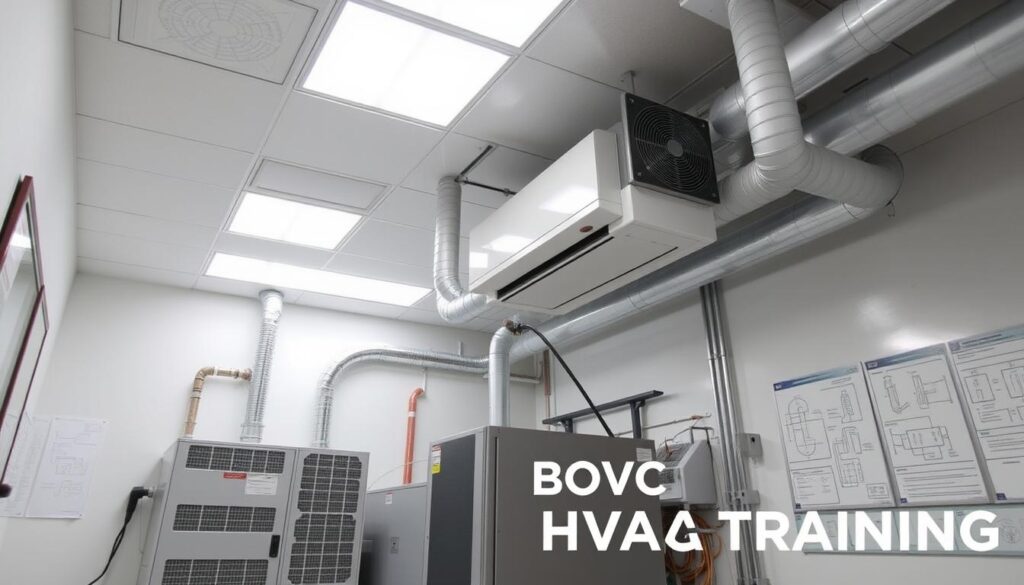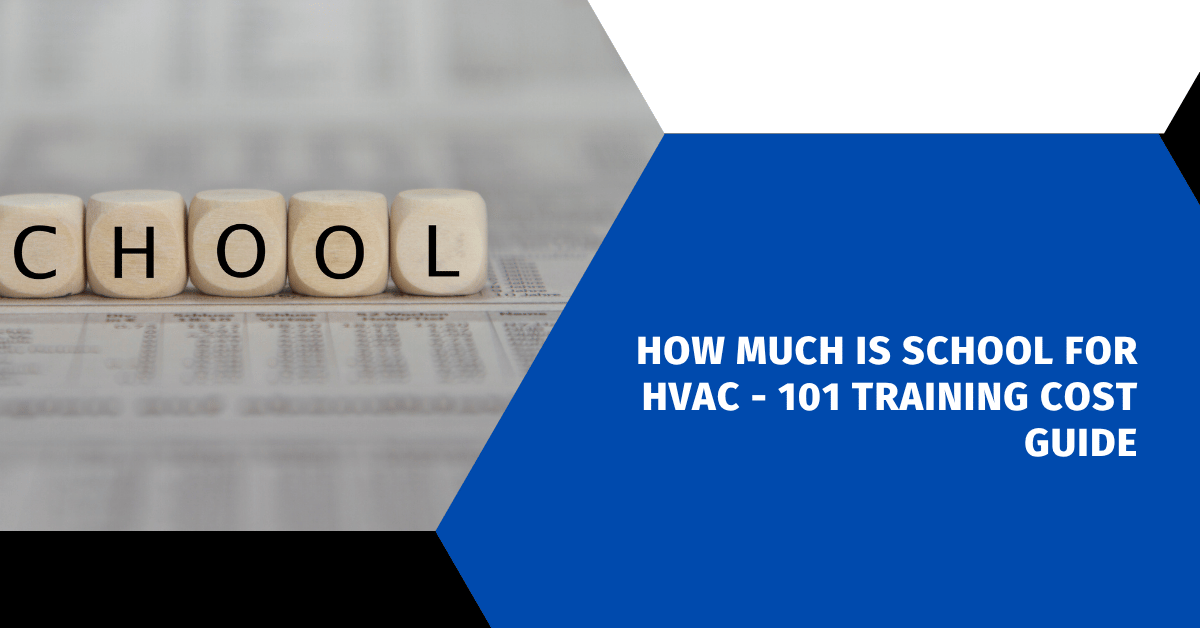Affiliate Disclosure
HVAC Guide Guys is a participant in the Amazon Services LLC Associates Program, an affiliate advertising program designed to provide a means for sites to earn advertising fees by advertising and linking to Amazon.
How Much Is School for HVAC? Are you curious about the cost of HVAC school and if it’s worth it for your future career? Knowing the real cost of HVAC training can change everything for those wanting to join this vital industry.

HVAC training programs teach you about heating, ventilation, air conditioning, and refrigeration systems. Starting your HVAC career means planning your budget and making smart choices about training costs.
This guide will cover all you need to know about investing in your HVAC education. We’ll look at program costs and career chances. We aim to help you understand the financial side of your HVAC education choices.
Key Takeaways
- HVAC training costs vary widely depending on program type and institution
- Multiple funding options exist for aspiring HVAC professionals
- Programs range from certificate to associate degree levels
- Geographic location significantly impacts training expenses
- Potential earnings can offset initial educational investment
Table of Contents
Understanding HVAC Education Basics
Starting a career in HVAC needs careful planning and the right education. HVAC certification programs offer various paths for those wanting to become technicians. These paths help you learn the skills needed in this fast-paced field.
When you start HVAC training, you’ll learn about different programs, how long they last, and what you need to get in. Picking the right education can affect how much you spend on your HVAC degree and your job prospects.
Types of HVAC Programs Available
- Certificate Programs (6-12 months)
- Associate Degree Programs (2 years)
- Apprenticeship Training
- Online HVAC Certification Programs
- Manufacturer-Sponsored Training
Program Duration Options
| Program Type | Duration | Typical Cost Range |
|---|---|---|
| Certificate Program | 6-12 months | $1,200 – $5,000 |
| Associate Degree | 2 years | $10,000 – $30,000 |
| Apprenticeship | 3-5 years | Minimal tuition/Paid training |
Required Prerequisites
Most hvac certification programs need:
- High school diploma or GED
- Basic math and physics understanding
- Physical fitness for hands-on work
- Minimum age of 18
Choosing the right HVAC program depends on your goals, budget, and how you learn best. Do your research and talk to industry experts to make a smart choice.
Explore Our HVAC Shop
Looking for top-rated HVAC tools, parts, and accessories? Visit our shop and find the perfect solution for your needs.
Visit the ShopHow Much Is School for HVAC: Complete Cost Breakdown
Understanding the cost of HVAC training is key for those starting out. The cost can change based on several factors. Your total cost for HVAC training will likely be between $1,500 and $30,000. Most programs cost between $15,000 and $20,000.
Here’s a look at the possible costs you might face:
- Community College Programs: $3,000 – $10,000
- Technical School Training: $15,000 – $20,000
- Advanced Specialized HVAC Courses: $20,000 – $30,000
The costs for HVAC training include several important parts:
- Tuition: The main cost of your program
- Textbooks and Study Materials: About $500 – $1,000
- Equipment and Tool Costs: $500 – $2,000
- Certification Exam Fees: $100 – $500
The total cost depends on the program you choose. Trade schools usually offer more complete packages. Community colleges might be more affordable. Programs with advanced certifications will cost more.
Pro Tip: Always research financial aid options and scholarship opportunities to help offset your educational expenses.
Explore Our HVAC Shop
Looking for top-rated HVAC tools, parts, and accessories? Visit our shop and find the perfect solution for your needs.
Visit the ShopDifferent Types of HVAC Training Institutions
Choosing the right HVAC training institution is key for your vocational training investment. Each type offers unique benefits and ways to prepare you for a career in heating, ventilation, and air conditioning.
When looking at hvac trade school prices, you’ll find many educational paths. These paths are designed to meet different learning needs and career goals. Let’s look at the main types of HVAC training institutions:
Trade Schools and Technical Colleges
Trade schools focus on practical training for HVAC careers. They offer:
- Targeted curriculum concentrating on hands-on skills
- Shorter program durations (6-24 months)
- Direct industry-relevant training
- Potential job placement assistance
Community Colleges
Community colleges offer a more detailed approach to HVAC training. Their programs include:
- Broader educational background
- More affordable tuition rates
- Potential for associate degree completion
- Flexible scheduling options
Apprenticeship Programs
Apprenticeships mix classroom learning with real-world experience. They offer:
- Earning while learning
- Direct mentorship from experienced professionals
- Structured on-the-job training
- Potential for immediate employment
Your choice depends on your preferences, financial situation, and career goals. Each institution type offers unique opportunities to start your HVAC career.
Core Components of HVAC Training Costs
When you think about a career in heating, ventilation, and air conditioning, it’s important to know the costs. Your total HVAC education fees include more than just tuition. They cover several key areas.
Looking at the costs, you’ll find several financial aspects to consider for HVAC training:
- Tuition fees for classroom and practical instruction
- Required textbooks and study materials
- Specialized laboratory and equipment fees
- Personal protective gear and safety equipment
- Tool and instrument purchases
Most HVAC technical institutes have structured costs. Expect to spend between $1,200 and $15,000 for the whole program. This depends on the school and the program’s depth.
“Smart students plan for all possible expenses, not just tuition.” – HVAC Training Professionals Association
The cost you pay will change based on the program, its length, and the school’s needs. Community colleges might be cheaper. But, specialized technical institutes offer more in-depth training.
Looking into detailed cost breakdowns at different schools can help you choose wisely. This way, you can make a smart investment in your HVAC education.
Explore Our HVAC Shop
Looking for top-rated HVAC tools, parts, and accessories? Visit our shop and find the perfect solution for your needs.
Visit the ShopFactors Influencing HVAC School Expenses
Exploring hvac training costs reveals several key factors. These factors greatly affect your educational investment. Knowing these helps you make smart choices about your HVAC career.
HVAC education costs vary widely. Many factors influence the total cost of your training.
Geographic Location’s Financial Impact
Your location is a big factor in hvac training costs. Prices differ due to:
- Local cost of living
- Regional demand for HVAC technicians
- State-specific educational requirements
- Availability of training institutions
Program Reputation and Quality Considerations
The reputation of your HVAC program affects costs. Top programs with strong connections charge more but offer:
- Enhanced networking opportunities
- Higher job placement rates
- Advanced training equipment
- Experienced instructional staff
Additional Certification Investment
Specialized certifications add to your costs. But they also increase your career chances in HVAC.
Comparing different HVAC training costs is key. It helps you plan your education wisely.
Financial Aid and Funding Options

Getting an affordable HVAC education doesn’t have to be expensive. There are many ways to get financial help. This makes it easier to pay for your HVAC course.
Students have several ways to fund their HVAC training:
- Federal Student Aid (FAFSA) grants and loans
- State-specific scholarship programs
- Employer tuition reimbursement
- Technical school financial assistance
- Veterans educational benefits
Reducing your education costs starts with looking for and applying to different funding sources. Many students use a mix of financial aid to cut down on what they have to pay.
Scholarships for technical education can greatly reduce your tuition. Groups like the Air Conditioning Contractors of America (ACCA) and local trade associations offer financial help for HVAC students.
“Education is an investment in your future career” – HVAC Industry Experts
When looking for affordable HVAC education, consider these tips:
- Complete the FAFSA application early
- Contact school financial aid offices
- Investigate employer sponsorship programs
- Apply for multiple scholarships
- Consider work-study opportunities
By looking for financial support, you can make your HVAC training dream come true.
Explore Our HVAC Shop
Looking for top-rated HVAC tools, parts, and accessories? Visit our shop and find the perfect solution for your needs.
Visit the ShopReturn on Investment in HVAC Education
Getting an HVAC education can change your career for the better. Your investment in HVAC training can lead to long-term financial success and growth. The HVAC field is growing, with many chances for skilled technicians to work with heating, cooling, and ventilation systems.
It’s important to know the costs of your HVAC degree to make a smart career choice.
Salary After Graduation
HVAC technicians earn good money that increases with experience and skills. Newbies usually make between $35,000 and $45,000 a year. As you get more certified and skilled, your pay can go up fast.
- Entry-level technician: $35,000 – $45,000
- Mid-career professional: $50,000 – $65,000
- Experienced specialist: $65,000 – $85,000
- Management positions: $80,000 – $100,000+
Career Advancement Opportunities
Your HVAC training can lead to many career paths. You can go from a residential technician to a commercial systems designer. The field offers many chances to grow and specialize.
“The HVAC industry provides a stable and rewarding career path with continuous learning and advancement.” – Industry Expert
Potential career paths include:
- Service Technician
- Installation Specialist
- Project Manager
- HVAC Systems Designer
- Business Owner
Investing in HVAC education is more than just learning a trade. It’s about creating a strong, future-proof career with great earning power and flexibility.
Online vs. Traditional HVAC Training Costs
Choosing between online and traditional HVAC training can greatly affect your costs and learning experience. Both options have their own benefits for those looking for affordable HVAC education.

Online HVAC programs are popular for their flexibility and cost savings. Students can learn at their own pace, saving money on classroom learning costs.
- Lower tuition rates for online programs
- Reduced transportation and housing costs
- Self-paced learning opportunities
Traditional classroom training offers hands-on experience, essential for HVAC skills. It’s more expensive but provides direct instructor interaction and practical training.
| Training Type | Average Cost | Learning Style |
|---|---|---|
| Online HVAC Training | $3,000 – $8,000 | Flexible, Self-Directed |
| Traditional Classroom | $5,000 – $15,000 | Structured, Hands-On |
“The best HVAC training program depends on your individual learning needs and financial situation.” – HVAC Industry Expert
Think about your learning style, budget, and career goals when choosing between online and traditional HVAC training. Researching carefully can help you find the best and most affordable HVAC education.
Explore Our HVAC Shop
Looking for top-rated HVAC tools, parts, and accessories? Visit our shop and find the perfect solution for your needs.
Visit the ShopEssential Tools and Equipment Expenses
Starting an HVAC career is more than just paying for school. You’ll also need to buy tools and equipment for your training. Knowing these costs helps you plan your education better.
When looking at hvac trade school prices, remember there are extra costs. HVAC students need specific tools and safety gear to learn well.
Required Personal Tools
Here’s what you’ll need for HVAC training:
- Screwdriver set ($50-$100)
- Multimeter ($80-$200)
- Adjustable wrench ($20-$50)
- Tube cutter ($30-$75)
- Electrical tape ($5-$15)
Safety Equipment Costs
Safety is key in HVAC training. You’ll need:
- Safety glasses ($10-$30)
- Work gloves ($15-$40)
- Steel-toe boots ($100-$250)
- Hard hat ($20-$50)
Training Materials
You might also need:
- Textbooks ($100-$300)
- Digital learning resources ($50-$150)
- Practice manuals ($30-$80)
“Investing in quality tools is investing in your future career success.” – HVAC Professional Advice
It’s wise to buy tools little by little. This way, you can spread out the cost over your training. Many schools offer tool packages or advice to help you choose.
Conclusion
Getting an HVAC education is a smart move for your future. Knowing the costs helps you plan better. The rewards of HVAC training are worth the investment.
Looking into different training options and understanding fees is key. It can greatly affect your career success. Every step you take in your education is building a strong base for a good HVAC career.
Choosing the right HVAC program is not just about the price. Look at the program’s quality, hands-on training, and career paths. Good research and planning will set you up for success in this field.
Start by reaching out to local trade schools, community colleges, and HVAC organizations. They can help with training, financial aid, and job opportunities. This will guide you towards your career goals and financial needs.
FAQ
How much does HVAC school typically cost?
How much does HVAC school typically cost?
FAQ
How much does HVAC school typically cost?
HVAC school costs vary. They can range from
FAQ
How much does HVAC school typically cost?
HVAC school costs vary. They can range from $1,200 to $15,000. Certificate programs are usually the cheapest. Associate degree programs at community colleges or technical institutes cost more. Online programs are often more affordable, with costs depending on the school and program.
What financial aid options are available for HVAC students?
HVAC students have several financial aid options. You can get federal student loans, Pell Grants, and HVAC-specific scholarships. There are also veteran’s benefits and employer-sponsored tuition reimbursement programs. Many schools offer financial help to reduce your costs.
How long does HVAC training typically take?
HVAC training program lengths vary. Certificate programs last 6-12 months. Associate degree programs take 2 years. Apprenticeships can last 3-5 years. The time depends on your study path and whether you study full-time or part-time.
What additional expenses should I budget for beyond tuition?
You’ll need to budget for textbooks, tools, safety equipment, and personal protective gear. Expect to spend $500-$2,000 on tools and equipment. Some programs include tool costs in their tuition, so check with your school for details.
Are online HVAC training programs less expensive than traditional programs?
Online HVAC training is often cheaper. It has lower tuition rates and fewer expenses like commuting. But, make sure the program offers enough hands-on training, which is key in HVAC.
What certifications are required after HVAC training?
After training, you’ll need EPA Section 608 Certification for refrigerants. Getting certifications from NATE (North American Technician Excellence) can also boost your career. Some certifications have exam fees from $50 to $300.
Can I work while attending HVAC school?
Many HVAC programs offer flexible schedules. This includes evening and weekend classes, allowing you to work while studying. Some apprenticeships combine work and classroom learning.
What is the typical salary after completing HVAC training?
New HVAC technicians earn $35,000 to $45,000 a year. With experience and more certifications, you can earn $50,000 to $75,000 or more. Specialized areas like commercial HVAC can offer even higher salaries.
Do I need prior technical experience to enter an HVAC program?
Most HVAC programs don’t require prior technical experience. You’ll need basic math skills, mechanical aptitude, and a willingness to learn. Some programs might ask for a high school diploma or equivalent.
Are there differences in HVAC training costs between urban and rural areas?
Yes, HVAC training costs differ by location. Urban areas with higher costs have more expensive programs. Rural areas might offer cheaper options. But, urban areas often have more job opportunities and higher starting salaries.
,200 to ,000. Certificate programs are usually the cheapest. Associate degree programs at community colleges or technical institutes cost more. Online programs are often more affordable, with costs depending on the school and program.
What financial aid options are available for HVAC students?
HVAC students have several financial aid options. You can get federal student loans, Pell Grants, and HVAC-specific scholarships. There are also veteran’s benefits and employer-sponsored tuition reimbursement programs. Many schools offer financial help to reduce your costs.
How long does HVAC training typically take?
HVAC training program lengths vary. Certificate programs last 6-12 months. Associate degree programs take 2 years. Apprenticeships can last 3-5 years. The time depends on your study path and whether you study full-time or part-time.
What additional expenses should I budget for beyond tuition?
You’ll need to budget for textbooks, tools, safety equipment, and personal protective gear. Expect to spend 0-,000 on tools and equipment. Some programs include tool costs in their tuition, so check with your school for details.
Are online HVAC training programs less expensive than traditional programs?
Online HVAC training is often cheaper. It has lower tuition rates and fewer expenses like commuting. But, make sure the program offers enough hands-on training, which is key in HVAC.
What certifications are required after HVAC training?
After training, you’ll need EPA Section 608 Certification for refrigerants. Getting certifications from NATE (North American Technician Excellence) can also boost your career. Some certifications have exam fees from to 0.
Can I work while attending HVAC school?
Many HVAC programs offer flexible schedules. This includes evening and weekend classes, allowing you to work while studying. Some apprenticeships combine work and classroom learning.
What is the typical salary after completing HVAC training?
New HVAC technicians earn ,000 to ,000 a year. With experience and more certifications, you can earn ,000 to ,000 or more. Specialized areas like commercial HVAC can offer even higher salaries.
Do I need prior technical experience to enter an HVAC program?
Most HVAC programs don’t require prior technical experience. You’ll need basic math skills, mechanical aptitude, and a willingness to learn. Some programs might ask for a high school diploma or equivalent.
Are there differences in HVAC training costs between urban and rural areas?
Yes, HVAC training costs differ by location. Urban areas with higher costs have more expensive programs. Rural areas might offer cheaper options. But, urban areas often have more job opportunities and higher starting salaries.

